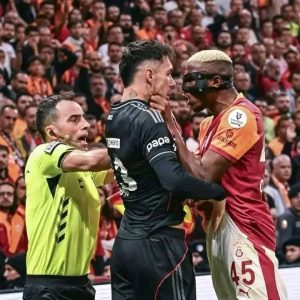By Oyelowo Khalid

Over the years, African footballers have faced a painful and persistent challenge in European football—racial discrimination. Despite their undeniable talent and contribution to the game, many African players continue to experience racial abuse from fans, opponents, and, sometimes, even from their own clubs.
Every time an African player steps into the field, he carries more than just a ball, he carries history, identity, and the hope of millions of people back home. Yet, even as they dribble past defenders and score unforgettable goals, they are still forced to fight the oldest battle of all—to be seen as equals.
The Federation Internationale de Football Association (FIFA), and Union of European Football Association (UEFA), have sanctioned several racist offenders as against the Law of Humanity and football rules, but racism remains a stubborn stain on the sport. However, the bodies’ interventions have reduced the problem to some extent.
Osimhen: A Modern-Day Victim
Victor Osimhen, Nigeria’s Super Eagles Talisman, now playing for Galatasaray in the Turkish league, has been a frequent target of racist attacks, not only in Turkey but also during his time at Napoli in Italy.
In 2022, during a Serie A match between Napoli and Hellas Verona, Victor Osimhen scored the winning goal for Napoli, but he was met with monkey chants from Verona fans. Although Serie A authorities sanctioned the club, the emotional trauma Osimhen suffered could not be erased.
The situation worsened in 2023 when Osimhen missed a penalty. His own club, Napoli, mocked him in a TikTok video using the caption, “Gimme a penalty please,” and later released another video allegedly comparing him to a coconut. Despite being the club’s top scorer and a fan favorite, Osimhen was publicly humiliated—a painful reminder that African players are often celebrated only until they make a mistake.
When he moved to Galatasaray in 2025, the nightmare followed. In early October, during a tense match against Besiktas, an opposing player allegedly called him a “black monkey.” The incident sparked outrage, though the Turkish and international football authorities are currently investigating that, yet no significant action has been taken.
Not a New Struggle
Racism in football did not begin with Osimhen’s generation, we have our African legends who have been victims of racial discrimination over the years.
In the 2005/06 La Liga season, Samuel Eto’o was racially abused by Real Zaragoza fans while playing for Barcelona. The African legend almost walked off the pitch in protest as racism chants remained persistent.
Kalidou Koulibaly, the former Napoli defender, also endured repeated racial abuses while playing for the Italian side. In a 2016 match against Lazio, the defender experienced monkey noises from the opponents fans every time he touched the ball. A similar incident occurred in 2018 at San Siro against Inter Milan, leading to a public apology from Milan’s mayor, but can that heal the trauma of the victimized player?
Even as far back as 1996, racism played a role in one of football’s most infamous clashes. Liberian icon George Weah reportedly punched Portuguese player Jorge Costa and broke his nose at the tunnel after being racially insulted during a Champions League match. This case highlighted the emotional and physical pain of the repeated racial abuse by the white men in sports.
Standing Against Hate: Legends Speak, But Is Anyone Listening?
Racism is not only condemned by the affected players, over time, both African and European legends have spoken out against racism in football.
Diedier Drogba, the former Chelsea striker called out UEFA and FIFA to implement stricter punishments for the racist. He made it known in his statement that racism is not allowed and we need to act against it. “Racism has no place in football, we can’t just keep saying it, we need to act , punish and educate. Enough is enough.”
Similarly, Yaya Toure, former Manchester City star made a statement after he was racially abused while playing for Manchester City. “If UEFA don’t take action, players will. We cannot continue to be insulted because of the color of our skin,” he lamented.
Gareth Southgate, manager of the England national team, also condemned racism after several of his Black players were abused due to their skin colour, following the Euro 2020 final defeat.
“When our players were abused, it wasn’t just a football issue, it was a human issue. We stand against racism and will continue supporting our players,” Southgate explained.
